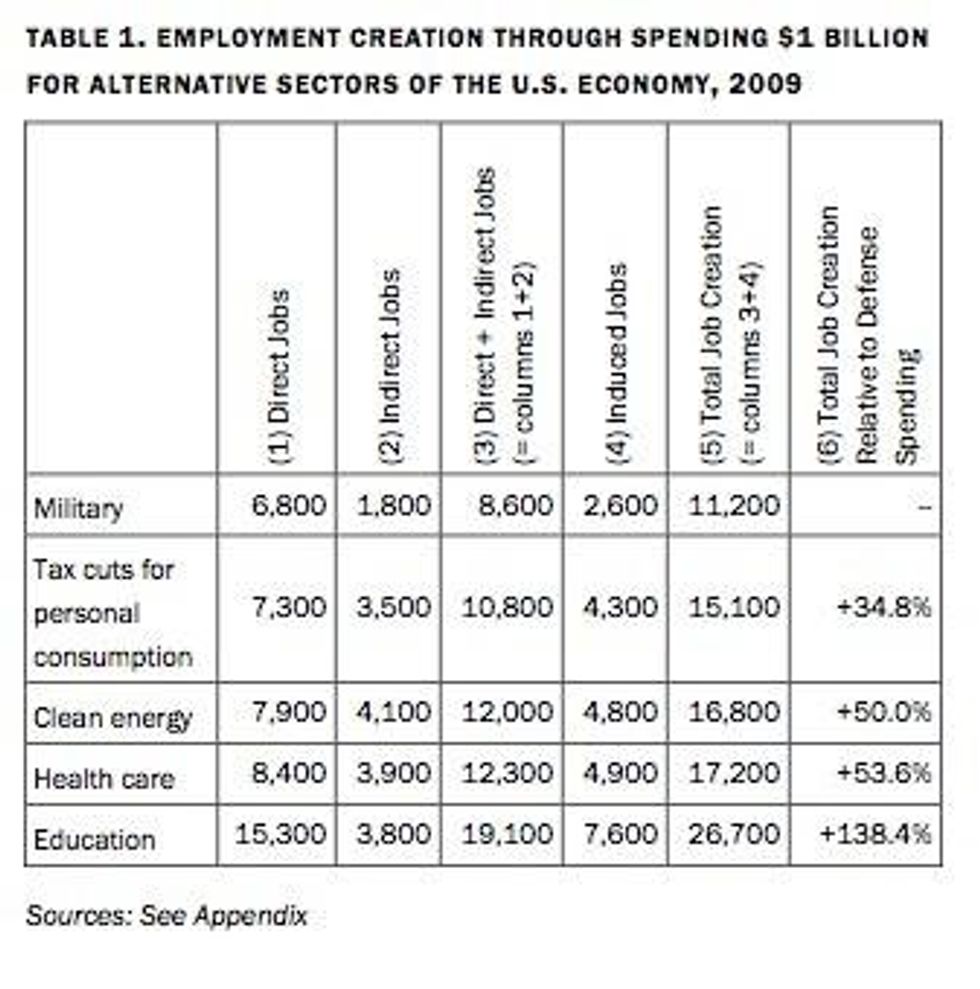I claim that the following is a basic economic fact, which all Keynesian economists should readily acknowledge: in the current federal budget political context, in which federal borrowing is capped under the Budget Control Act, and repealing the BCA's borrowing cap is not under serious consideration; and in which increased taxes on the super-rich, like a Wall Street speculation tax, are not considered politically viable in Washington, unnecessary Pentagon spending will destroy American jobs.
Before explaining why we know this fact to be the case, let's consider two related reasons why this fact matters a great deal right now: the Burlington F-35 basing fight and the apparent return of the proposed federal budget "Grand Bargain."
In Burlington, Vermont, the city council, which owns Burlington International Airport, is considering a resolution to ban the basing of the noisy, dangerous, problem-plagued F-35 warplane at the city-owned airport.
If all the city council had to weigh were the concerns of the residents who will be displaced by the noisy F-35, and the residents who are concerned about the danger of basing the experimental, problem-plagued F-35 in a densely populated area, it would be a slam dunk. The city council would vote to reject basing the F-35 at BIA.
What's the argument on the other side? Jobs. Supporters of basing the F-35 in Burlington claim that bringing the F-35 to Burlington will bring more federal dollars to Burlington, and therefore more local jobs.
Even in a narrow, local sense, the jobs argument is dubious. The Air Force has conceded that the Vermont National Guard will continue to have a mission, with or without the F-35 being based at BIA. Any local difference in jobs is going to be tiny, barely perceptible in the context of Burlington's overall economy.
But in terms of national budget policy, the claim that the F-35 is creating jobs is completely wrong. The F-35 is not creating jobs. The F-35 is destroying jobs. That's because with federal borrowing capped, with increased taxes on the super-rich off the table, more money for the F-35 is going to come from cutting domestic spending - like Social Security checks - or raising taxes on the middle class. Cutting Social Security checks and raising taxes on the middle class to pay for the F-35 would destroy more jobs than the F-35 creates.
If supporters of the F-35 had to concede that they support destroying American jobs to pay for the F-35, Burlington would be having a very different discussion. We'd be back to the slam dunk, and the Burlington council would easily vote to block basing the F-35 at BIA, based on residents' concerns about noise, displacement, and safety.
This bring us to the "Grand Bargain." The "Grand Bargain" is the proposal for a budget deal between President Obama and Speaker Boehner that would cut Social Security checks, raise taxes on the middle class, and turn off Pentagon budget cuts. Congressional Republicans who have voted to partially shut down the government are saying that "entitlement reform" is the ransom they are going to demand for raising the federal debt ceiling. "Entitlement reform" is a euphemism for cutting Social Security checks. Some Democrats are saying that they are ready to accept "entitlement reform" - cutting Social Security checks - as the ransom for raising the debt ceiling, but only if Republicans accept "increased revenue." "Increased revenue" here is a euphemism for raising taxes on the middle class, as AFL-CIO Director of Policy Damon Silvers explains:
The tax increases the Grand Bargain crowd advocate tend to be aimed at the middle class--they are "base broadening" ideas like ending the tax exclusion for health insurance or ending the home mortgage deduction. They will add to the bizarre unfair upside down u-shaped curve of our tax system--the fact that when you put together income taxes, payroll taxes and sales taxes, poor people pay less of their income in taxes than middle-income people, but the very rich pay a smaller percentage than either the poor or the rich in taxes.
The tax side of the Grand Bargain generally asks nothing of big corporations--typically Grand Bargain proposals include the idea of revenue neutral corporate tax reform and stays away from tax proposals aimed at restoring fair taxation for the 1%, like raising the capital gains rate, creating new high-income brackets or creating a financial transaction tax. Proposals for a Grand Bargain also include lowering tax rates on the 1% and corporations and providing more tax incentives for sending jobs overseas.
So, the Grand Bargain is essentially about taking money from middle income people through Social Security cuts and tax increases and giving the money to the Pentagon for unnecessary Pentagon spending.
In addition to being a reallocation of national resources from the 99% to the 1%, the Grand Bargain would destroy American jobs.
This was documented in a 2011 study by economists Robert Pollin and Heidi Garrett-Peltier at the University of Massachusetts. They showed that if the federal government could borrow and spend a billion dollars, the government would create more jobs by spending the money on education, health care, clean energy, or tax cuts to promote personal consumption (like the payroll tax holiday) than by spending it on the Pentagon.
It follows from the 2011 study by subtraction that if federal borrowing is capped, and higher taxes on the super-rich are off the table, so that adding money to the Pentagon budget requires that it be taken from somewhere else in the budget in the form of reduced domestic spending and higher taxes on the middle class, then unnecessary Pentagon spending destroys jobs, because whatever jobs are created by the additional Pentagon spending are more than offset by the greater number of jobs destroyed by cutting domestic spending and raising taxes on the middle class.
Look at Table 1 on page 5 of the University of Massachusetts study (right). A billion dollars added to the Pentagon budget, if you can borrow the money, adds 11,200 jobs. A billion dollars added to the domestic economy through tax cuts to promote personal consumption (like the payroll tax holiday) adds 15,100 jobs. All other means of increasing domestic spending - education, health care, clean energy - add more jobs than tax cuts. So we can use tax cuts as a floor for comparison (confirmed by personal communication with the study authors, August 2012.) If we cut spending in these areas rather than increasing it, we have the same effect as increasing spending, but with the opposite sign: we destroy as many jobs with cuts as we would have created by spending the same amount of money. Raising taxes on working families by a billion destroys 15,100 jobs. So, if we increase Pentagon spending by a billion and raise taxes on working families to pay for it, the net effect is to destroy 3,900 jobs. If within a year (in practice this would happen over ten years) we turned off $500 billion worth of Pentagon cuts and paid for it by cutting Social Security payments by means of the chained CPI, raising the Medicare retirement age, and raising taxes on working families, we'd destroy about two million jobs. That would raise the national unemployment rate by about one and a half percentage points.
Now, you may be thinking to yourself: if it's so obvious that in the current federal budget context, unnecessary Pentagon spending destroys jobs, and thus that the Grand Bargain would destroy jobs and raise the national unemployment rate, why isn't this fact more widely acknowledged? There are two key reasons.
The first reason is that there are powerful economic and political forces that don't want you to know this fact - what President Eisenhower, in his farewell address, called the "military-industrial complex" - and there are as yet no sufficiently powerful economic and political forces that have a strong interest in making sure that you know this fact.
The second reason is that, whether we like it or not, logic and evidence only form a part of what the broad public thinks it knows about economic policy. What people in Washington call "validators" matter a great deal. The vast multitude of liberal Democrats look to prominent liberal "public intellectual" economists to tell them what's what on economic policy.
That means that if prominent Keynesian public intellectuals like Paul Krugman, Robert Reich, and Joe Stiglitz would stand in the public square now and say clearly that in the current federal budget context, with federal borrowing capped and taxes on the super-rich off the table, unnecessary Pentagon spending will destroy jobs, it would likely have a significant impact on public discourse.
I claim that if the question is clearly put to them, they will have no choice but to say this, because it follows by arithmetic from the University of Massachusetts study.
Let's put this proposition to the test. Let's ask our Keynesian economists: with federal borrowing capped and taxing the super-rich off the table, won't more unnecessary Pentagon spending destroy American jobs?

